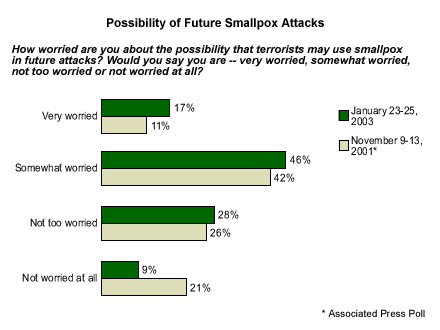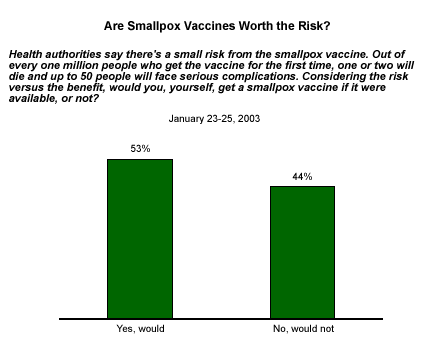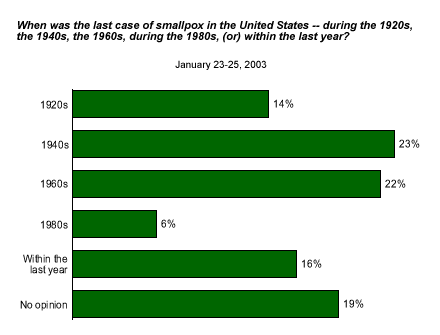Fear about the use of smallpox in future attacks against the United States has increased somewhat in the last 15 months, according to the results of a recent Gallup Poll*. Presently, nearly two-thirds of Americans (63%) are worried about the threat of future smallpox attacks, including 17% who are "very worried." A November 2001** poll conducted by the Associated Press asked the same question and results showed 53% of Americans worried, including 11% who were very worried.

This shift in attitudes suggests that fear of a smallpox attack may be more closely linked with the threat of confrontation with Iraq than with attacks by terrorist organizations such as al Qaeda. In recent months, as tensions between the United States and Iraq have escalated, media coverage of possible bioterrorist attack scenarios, including a smallpox outbreak, has increased, as has coverage of the smallpox vaccine and its future availability to the general public.
Americans Suspicious of Smallpox Vaccine
Despite the potential health risks associated with getting a smallpox vaccine, a slim majority of Americans say they would get the vaccine if it were available, even after the risks were spelled out to them. (The question noted that: "Health authorities say there's a small risk from the smallpox vaccine. Out of every one million people who get the vaccine for the first time, one or two will die and up to 50 people will face serious complications." Forty-four percent would not get the vaccine. Earlier Gallup polling showed similar results even if the risks were not described to survey respondents, suggesting that the public may be aware that there are risks involved with getting vaccinated for smallpox.

In the January poll, Gallup also asked Americans what they think about some hospitals' refusal to participate in President Bush's plan to administer the smallpox vaccine to healthcare workers on a voluntary basis, because of the potential health risks of the vaccine. Interestingly, a majority of Americans share the skepticism of these hospitals. Slightly more than half of the public (53%) thinks hospitals that refuse to participate are doing the right thing, while 39% feel that they are doing the wrong thing.
Few Americans Know Decade of Last U.S. Smallpox Case
In the January poll, less than a quarter of Americans were able to accurately date the last case of smallpox in the United States. Twenty-three percent correctly answered that the last case was in the 1940s. Twenty-two percent said that it was in the 1960s, and 16% thought it was within the last year.

Actually, the last case of smallpox in the United States was in 1949, and the last naturally occurring case of smallpox in the world was in Somalia in 1977. In 1980, it was believed that the virus had been eradicated and nearly all samples had been destroyed. However, laboratories in Atlanta and Moscow are known to have kept samples.
Bottom Line
While nearly two-thirds of Americans fear a smallpox attack, only 53% say they would get the vaccine if it were available to them. This suggests reluctance by a substantial proportion of Americans given the health risks associated with the smallpox vaccine.
*Results are based on telephone interviews with 1,000 national adults, aged 18 and older, conducted Jan. 23-25, 2003. For results based on the total sample of national adults, one can say with 95% confidence that the maximum margin of sampling error is ±3%.
**Results are based on telephone interviews with 1,000 national adults, aged 18 and older, conducted Nov. 9-13, 2001. For results based on the total sample of national adults, one can say with 95% confidence that the maximum margin of sampling error is ±3%.